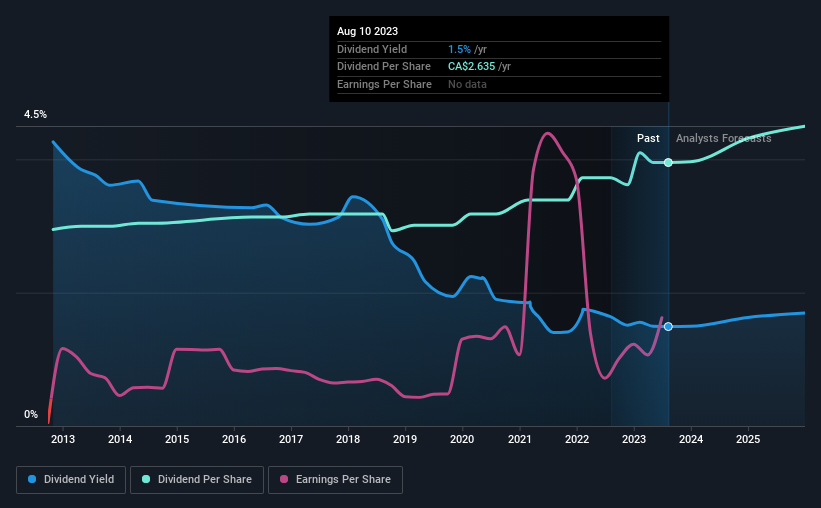There's A Lot To Like About Thomson Reuters' (TSE:TRI) Upcoming US$0.49 Dividend
Readers hoping to buy Thomson Reuters Corporation (TSE:TRI) for its dividend will need to make their move shortly, as the stock is about to trade ex-dividend. The ex-dividend date is one business day before the record date, which is the cut-off date for shareholders to be present on the company's books to be eligible for a dividend payment. The ex-dividend date is important because any transaction on a stock needs to have been settled before the record date in order to be eligible for a dividend. This means that investors who purchase Thomson Reuters' shares on or after the 16th of August will not receive the dividend, which will be paid on the 15th of September.
The company's next dividend payment will be US$0.49 per share, and in the last 12 months, the company paid a total of US$1.96 per share. Based on the last year's worth of payments, Thomson Reuters has a trailing yield of 1.5% on the current stock price of CA$176.65. If you buy this business for its dividend, you should have an idea of whether Thomson Reuters's dividend is reliable and sustainable. So we need to check whether the dividend payments are covered, and if earnings are growing.
View our latest analysis for Thomson Reuters
Dividends are usually paid out of company profits, so if a company pays out more than it earned then its dividend is usually at greater risk of being cut. That's why it's good to see Thomson Reuters paying out a modest 43% of its earnings. A useful secondary check can be to evaluate whether Thomson Reuters generated enough free cash flow to afford its dividend. It paid out more than half (54%) of its free cash flow in the past year, which is within an average range for most companies.
It's encouraging to see that the dividend is covered by both profit and cash flow. This generally suggests the dividend is sustainable, as long as earnings don't drop precipitously.
Click here to see the company's payout ratio, plus analyst estimates of its future dividends.
Have Earnings And Dividends Been Growing?
Businesses with strong growth prospects usually make the best dividend payers, because it's easier to grow dividends when earnings per share are improving. Investors love dividends, so if earnings fall and the dividend is reduced, expect a stock to be sold off heavily at the same time. It's encouraging to see Thomson Reuters has grown its earnings rapidly, up 38% a year for the past five years.
Many investors will assess a company's dividend performance by evaluating how much the dividend payments have changed over time. In the last 10 years, Thomson Reuters has lifted its dividend by approximately 3.0% a year on average. It's good to see both earnings and the dividend have improved - although the former has been rising much quicker than the latter, possibly due to the company reinvesting more of its profits in growth.
Final Takeaway
Has Thomson Reuters got what it takes to maintain its dividend payments? Earnings per share have grown at a nice rate in recent times and over the last year, Thomson Reuters paid out less than half its earnings and a bit over half its free cash flow. Thomson Reuters looks solid on this analysis overall, and we'd definitely consider investigating it more closely.
With that in mind, a critical part of thorough stock research is being aware of any risks that stock currently faces. Be aware that Thomson Reuters is showing 2 warning signs in our investment analysis, and 1 of those doesn't sit too well with us...
A common investing mistake is buying the first interesting stock you see. Here you can find a full list of high-yield dividend stocks.
Have feedback on this article? Concerned about the content? Get in touch with us directly. Alternatively, email editorial-team (at) simplywallst.com.
This article by Simply Wall St is general in nature. We provide commentary based on historical data and analyst forecasts only using an unbiased methodology and our articles are not intended to be financial advice. It does not constitute a recommendation to buy or sell any stock, and does not take account of your objectives, or your financial situation. We aim to bring you long-term focused analysis driven by fundamental data. Note that our analysis may not factor in the latest price-sensitive company announcements or qualitative material. Simply Wall St has no position in any stocks mentioned.

